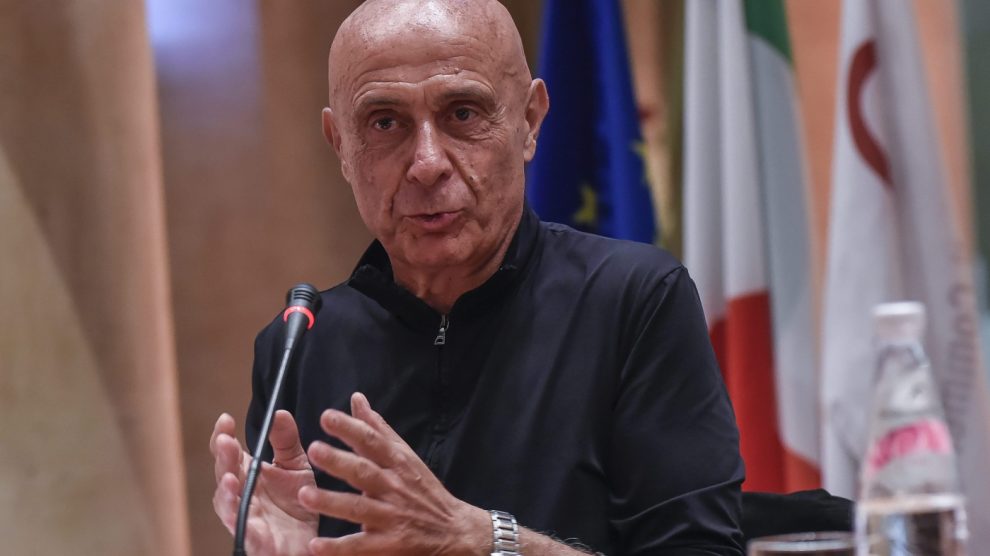Marco Minniti discusses migration. In Italy, the issue is back in the spotlight since the government’s clash with NGO ships and the ensuing spat with France over refugee reallocation and European solidarity. In an interview with Il Foglio, the Former Interior Minister and current head of the Med-Or Foundation gave an all-encompassing take on the subject.
- He supports current Interior Minister Matteo Piantedosi’s proposition to regulate humanitarian organisations dealing with maritime rescue. Nevertheless, he noted, “NGOs used to manage 40% of the flows, and today the figure is only 10%. This game, while symbolic for the current government, is in any case not decisive.”
A longer-range outlook. That’s not to say the migration issue is not pressing, continued Mr Minniti. “In these hours we have passed the political and psychological threshold of 100,000 arrivals in [Italy]. If it continues like this, next year we could touch 150,000,” nearing the numbers of the 2015-2016 record influx that caused political turmoil across the EU.
- “Immigration is now a structural condition of the planet and must be addressed as such. The fundamental challenge is to be able to govern the flows,” he noted.
Russia’s role. As he had told Decode39, Mediterranean migration has become the second lever in Russia’s humanitarian pincher (with the first being Ukrainian refugees in the bloc’s East). Inflation and cost-of-food crisis favour instability and thus departures, so the solution must necessarily address the conditions in African countries.
- Egypt has already negotiated a loan with the IMF to contain the price of wheat and its derivatives, and so has Tunisia – the only democratic outcome of the 2011 Arab Springs – just recorded a dismal turnout of 8.8% in last week’s legislative elections.
- “This is a dramatic sign of a democratic crisis. Considering the social and food crisis too, we may realise the risks: the destabilisation of these countries is a gigantic problem for Europe.”
Focus on the spring… In Mr Minniti’s view, the migration issue requires an immediate European response – in the form of a plan for Africa.”We must intervene with an immediate plan financed with European investment and cohesion funds with three fundamental points: support for economic growth, support for cohesion and social resilience, and commitment to the prosperity of those populations.”
- This is the starting point for any vision of governing migration flows, he pointed out. “You don’t need big numbers; six billion – like the [funds] given to Turkey – is enough. But they are needed now. Otherwise, we risk finding ourselves with the ripple effect of 2011, without even the illusion of a new [Arab] spring.”
… and on autocracies. Another key risk is leaving a vacuum for autocratic powers – namely, Russia and China – to occupy. “We must ask ourselves: why is it that Russia, which had to declare general mobilisation to fight the war in Ukraine, is keeping Wagner’s military in Cyrenaica and Mali? For what reasons has Chinese hegemony over a large chunk of Africa increased in recent weeks?” In short, writes Il Foglio, can China and Russia use immigration as a weapon?
- “The presence of the Russians and Chinese is no accident. Europe must act united. Until now, Africa has been an element of competition and the result is there for all to see: Russia in Mali, China in North Africa and Turkey in Libya.”
About Libya: European financial intervention may stimulate Libya – which is a transit country, subject to intense political instability – to finally resolve internal disputes over the rightful government. “Then we must also demand the closure of [migrant] detention centres; this can be done through a scheme that includes the EU, Libya, the UN and the African Union to create legal humanitarian corridors.”
- UN agencies must determine who is entitled to international protection, he continued, with the latters being returned to their countries of origin (with assistance from the African Union) “with a budget to rebuild their lives: they are called assisted returns and we have already done them.”




